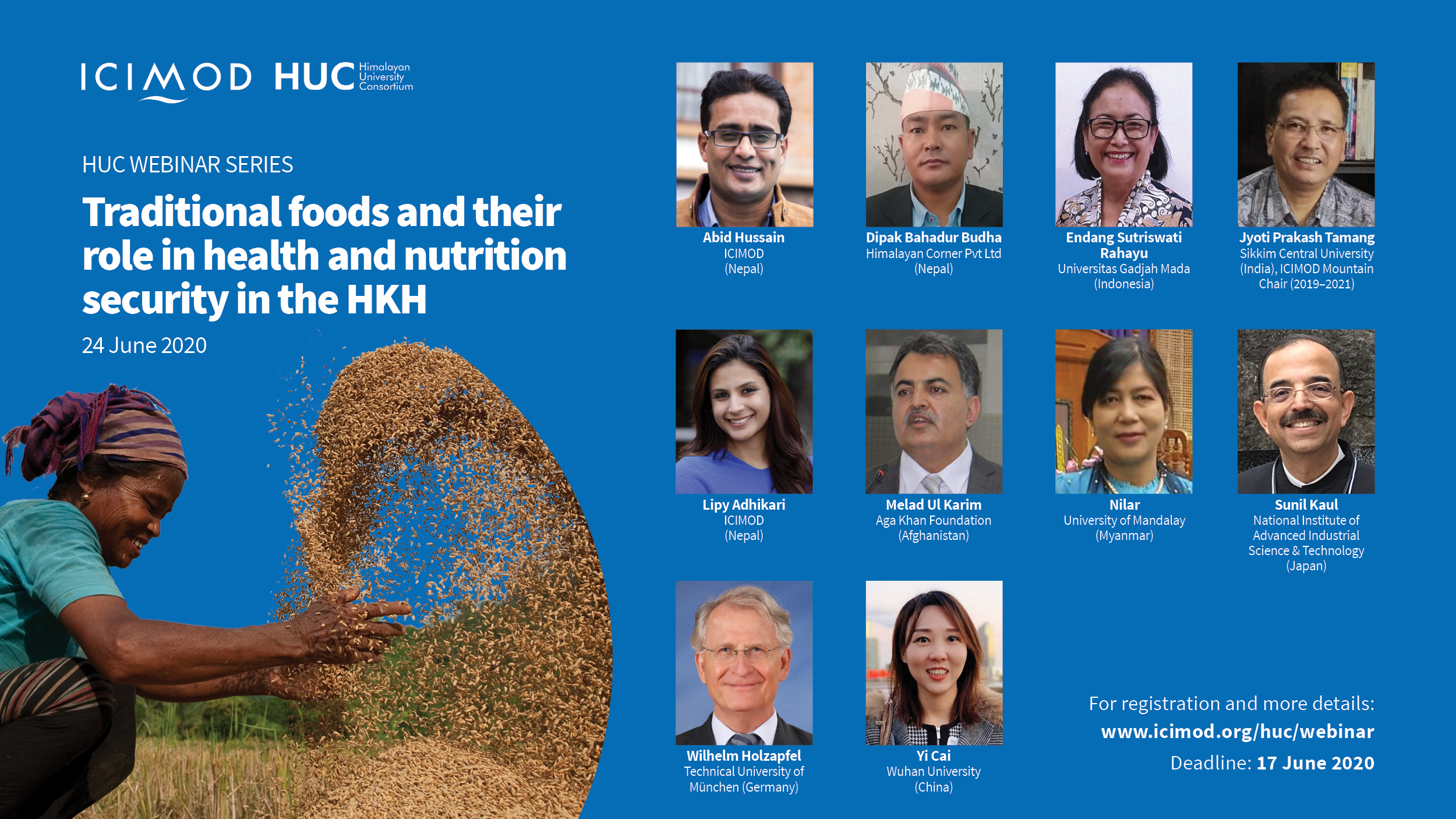Storying the sustainable intelligence of the Earth in the new Himalaya

Co-organized by: Thematic Working Group on Trans-Himalayan Environmental Humanities, Himalayan University Consortium (HUC) – International Centre for Integrated Mountain Development (ICIMOD); and National Centre for Borderlands Ethnic Studies in Southwest China at Yunnan University (NaCBES)
In partnership with: Institute of Cultural Anthropology and Development Sociology, Leiden University; University of Warwick; and Yale Forum on Religion and Ecology
Background
2020 marks the beginning of the UN Decade of Action, which calls for expedited global, local, and community actions to fulfill its 2030 Agenda for Sustainable Development Goals, initiated in 2016. At the same time, 2020 has also seen a pandemic with massive and far-reaching consequences across areas of human health, poverty, inequality and human-induced environmental crises. Any successful approach to addressing these issues will require a re-evaluation of our species-centred development agenda and recognition of the intelligence of the Earth found in humanity’s diverse sets of traditional environmental knowledge.
About the seminar
In this context, the Himalayan University Consortium (HUC) Thematic Working Group on Trans-Himalayan Environmental Humanities calls interested graduate students and early career scholars and scientists in Himalayan environmental studies to join our seminar, intended as a publishing project. Led by a group of multi-disciplinary experts, the seminar will offer a series of interactive lectures, thematic discussions, peer presentations, and group mentorship opportunities for research writing as part our effort to advance environmental humanities in the Himalayan region. Apart from the scholarly competence building, participants will be introduced to partnership- and leadership-building approaches – preparing a new generation of scholar-leaders for the Hindu Kush Himalaya’s (HKH) sustainable future.
The lectures and individually presented case studies will be organized according to these key conceptual phrases: (1) “the new Himalaya”; (2) “symbiotic indigeneity” (3) and “transboundary commons”. They respectively refer to (1) an anthropogenically-conditioned Himalaya where the impacts of climate change and modernization projects can be found; (2) native modes of facing non-native forces of change; and (3) traditionally shared common-pool resources that have been transformed into bordered and therefore fragmented commons. While contextualizing their research findings in the Anthropocene, participants are encouraged to recount Himalayan community narratives concerning human–Earth relations in practical and affective terms. A selected number of the participants’ original research papers will be published in an international peer-reviewed journal special issue or an edited book through a reputable environmental studies publisher. For this purpose, the selected authors are expected to commit to the post-seminar revision process.
Participation criteria
The prerequisites for joining this seminar are (1) a near-completion field-based research project, in hand, related to the conceptual themes specified above; (2) commitment to reading a pre-distributed seminar material in advance of the web lectures-cum-tutorials, and contributing to in-depth discussions; (3) willingness to write and submit several short assignments during the course; (4) ability to offer constructive comments on fellow participants’ works; and (5) commitment to attend all sessions that might be scheduled at odd hours because of time zone differences.
Selection is strictly based on merit. Researchers and faculty from HUC full member institutions, especially women and members from under-represented communities, are strongly encouraged to apply. Faculty members who are teaching undergraduate or graduate courses in relevant fields, with a commitment to integrating some of the learning into their future teaching, are also encouraged to apply.
Application deadline
To be considered for admission, please send a letter of motivation, accompanied by a CV, and an abstract of your research in progress to huc@icimod.org by 17:00 Nepal Standard Time, 15 November 2020.
To know more about the call, please download the flyer.
Seminar faculty
The seminar will be jointly led by Dan Smyer Yü (Yunnan University) and Erik de Maaker (Leiden University), co-leaders of HUC Thematic Working Group on Trans-Himalayan Environmental Humanities. The seminar faculty consists of distinguished scholars based in the Himalaya, Australia, and Europe.
Keynote topics and speakers
“Military snails: Multispecies solidarities in Hawaii”
Thom van Dooren, Associate Professor and Australian Research Council Future Fellow in the Department of Gender and Cultural Studies and the Sydney Environment Institute at the University of Sydney, Australia; and Professor II in the Oslo School of Environmental Humanities at the University of Oslo, Norway
“Learning from Life stories”
Mandy Sadan, Associate Professor, School for Cross-Faculty Studies – Global Sustainable Development, University of Warwick; and Senior Research Fellow, Oxford School of Global and Area Studies
Programme directors
-
Chi H Truong (Shachi), Programme Coordinator and HUC Secretariat Lead, HUC–ICIMOD
-
He Ming, Leader of the First-Class Discipline Construction for Ethnology, Director of the National Centre for Borderlands Ethnic Studies in Southwest China at Yunnan University
Academic leads
-
Dan Smyer Yü, Kuige Professor of Ethnology, Yunnan University; and Co-leader of the Thematic Working Group on Trans-Himalayan Environmental Humanities, HUC–ICIMOD
-
Erik de Maaker, Assistant Professor, Institute of Cultural Anthropology and Development Sociology at Leiden University; and Co-leader of the Thematic Working Group on Trans-Himalayan Environmental Humanities, HUC–ICIMOD
Faculty members
-
Willem van Schendel, Professor Emeritus, Amsterdam University
-
John Grim, Co-Director, Yale Forum on Religion and Ecology
-
Mandy Sadan, Associate Professor, School for Cross-Faculty Studies – Global Sustainable Development, the University of Warwick and Senior Research Fellow, Oxford School of Global and Area Studies
-
Emily O’Gorman, Senior Lecturer, Environmental History, Department of Geography and Planning, Macquarie University, Australia
-
Charisma Lepcha, Assistant Professor of Anthropology, Sikkim University
-
Jelle Wouters, Senior Lecturer and Programme Leader of BA Political Science and Sociology, Faculty of Social Sciences, Royal Thimphu College
Biographies: Academic leads

Dan Smyer Yü
Dan Smyer Yü is Kuige Professor of Ethnology at the School of Ethnology and Sociology and the National Centre for Borderlands Ethnic Studies in Southwest China at Yunnan University. He currently serves as a member of the Advisory Group for the Yale Forum on Religion and Ecology and is an elected board member of the International Society for the Study of Religion, Nature, and Culture. Yü received his PhD in anthropology from the University of California at Davis in 2006. Prior to his current faculty appointment, he was the Founding Director of the Center for Trans-Himalayan Studies at Yunnan Minzu University, a Senior Researcher/Research Group Leader at the Max Planck Institute for the Study of Religious and Ethnic Diversity, and a core member of the Transregional Research Network at the University of Göttingen.
He is the author of Mindscaping the Landscape of Tibet: Place, Memorability, Eco-aesthetics (2015) and the co-editor of Religion and Ecological Sustainability in China (2014) and Trans-Himalayan Borderlands: Livelihoods, Territorialities, Modernities (2017).
His research interests are environmental humanities, religion and ecology, trans-Himalayan studies, sacred landscapes, climate change and mass migration, modern Tibetan studies, and comparative studies of Eurasian secularisms. His currently externally funded projects are “Trans-Himalayan Environmental Humanities” (HUC–ICIMOD), “India-China Corridor Project” (Swedish Research Council), and “Sustainable Lives in Scarred Landscapes: Heritage, Environment, and Violence in the China-Myanmar Jade Trade” (British Academy’s Sustainable Development Programme). His upcoming co-edited project publications are Trans-Himalayan Environmental Humanities: Symbiotic Indigeneity and the Animist Earth and Yunnan-Burma-Bengal Corridor Geographies: Protean Edging of Habitats and Empires.
Erik de Maaker
Erik de Maaker is Assistant Professor at the Institute of Cultural Anthropology and Development Sociology at Leiden University in the Netherlands. He is a member of the academic committee of the Leiden International Institute for Asian Studies and a founding member of the Asian Borderlands Research Network. Maaker obtained his PhD from Leiden University in 2006. His research interests include place making, relatedness, religion, heritage, materiality, visuality, and the life cycle. He has made several ethnographic films, including Teyyam: The Annual Visit of the God Vishnumurti (which received the 1998 Award for Excellence from the American Anthropological Association).
Some of his recent funded research projects include Markets, Ethics and Agency: Changing Land Utilization and Social Transformation in the Uplands of Northeast India (NWO–ICSSR) and Water and Climate Change in the Hindu Kush Himalayan Region (HUC–ICIMOD). Maaker has published extensively on social change in the uplands of eastern South Asia. His publications include the co-edited Media, Indigeneity and Nation in South Asia (2019) and Unequal land Relations in North East India: Custom, Gender and the Market (2020). Among his forthcoming publications are Reworking Culture: Relatedness, Rites and Resources in Garo Hills, North-East India (fc2021) and the co-edited Trans-Himalayan Environmental Humanities: Symbiotic Indigeneity and the Animist Earth (fc2021).
For more details see:
leidenuniv.academia.edu/ErikdeMaaker






